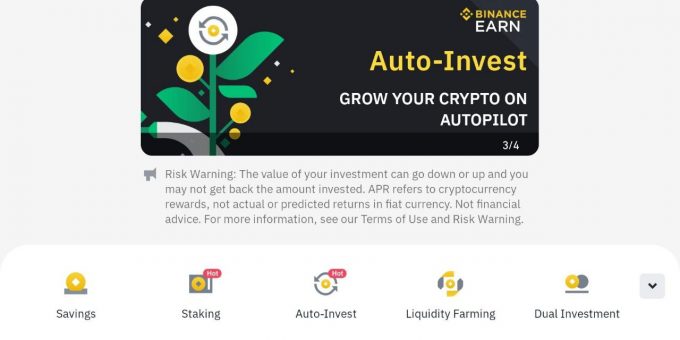
If you are investing – you probably know that there is always a risk. The recent crypto failures were unpredicted by many crypto-investors, for example, the crash of Terra-based stablecoin UST. It’s always a good idea to diversify your investment. That’s what I’m doing and in this article, I want to show one of the services which I use – Binance Earn. This article is not financial advice and the examples I put from my modest investments are purely educational.
Some words about Staking
There are many ways how you can get additional income in Binance Earn, in this article I will focus on Staking.
The essence of Staking comes from “Proof-of-Stake”, a cryptocurrency consensus mechanism for processing transactions and creating new blocks in a blockchain. Proof-of-stake (POS) was created as an alternative to Proof-of-work (POW), the original consensus mechanism used to validate a blockchain and add new blocks. So in simple words, staking is like mining. You can’t stake Bitcoin but you can stake many other cryptocurrencies.
In different cryptocurrencies staking works differently. This depends from the technical side of protocol. In very simple words – you need to “stake”, to “freeze” your balance and you will get rewards for this, in a way this might look similar to a bank deposit. In some cryptocurrencies you can use your funds whenever you can (so it’s kind of flexible deposit) in others you will need to wait for some time (i.e. 21 days) after “unstaking” so you won’t be able to use your funds. In some cryptocurrencies you start receiving rewards after you staked your coins, in others some time needs to pass (i.e. 14 days).
Binance simplifies all this process and that’s very good for newcomers to the cryptocurrency world. To be honest if you already picked up your favorite cryptocurrency(ies) – I would suggest to study it deeper, and maybe stake from several wallets (mobile, laptop, hardware wallets). But being a realist I understand that will be too complex for many users, and very often people don’t have time for additional studies.
Binance Locked Staking
Binance has currently 2 products in staking: Locked Staking and DeFi Staking. Locked Staking is the process of holding funds in a cryptocurrency wallet for a period of time and bearing interest on the locked/staked tokens. What’s interesting here is that in Binance Locked Staking program, both PoS tokens and non PoS tokens are included. Binance Staking returns staked funds to your Spot wallets at the end of the chose staking period. Such periods are: 15, 30, 60, 90 or 120 days (and usually the longer the period the bigger is percentage of APR).
So basically the user needs to think to make simple decision: choose particular cryptocurrency to invest, choose Time Period, and choose Estimated APR which will depend from the first two decisions.
Locked Staking Example – MATIC
Let’s take a look at my particular example – Polygon (MATIC) staking. Once again I need to repeat that it’s not an investment advice and I chose this paricular cryptocurrency for educational reasons. Also I chose MATIC as it’s APR for 90 days locked period is 21.54% – much higher than whenever you can find.
For this particular staking (with such hight APR for 90 days) I have a personal quota of 250 MATIC. It means that if I want to stake more – I will need to choose other period. On this image you can see that firstly I staked 39.21 MATIC and then after 1 day already go interest on it – 0.02312177 MATIC – I received it to my Spot wallet on Binance. Then I decided to stake more and staked 54 MATIC – at the moment of making this screenshot I didn’t receive interest yet.
In conclusion, I want to say that on many cryptocurrencies you might find very nice APR rate for long periods (90-120 days), often above 20%. What I can suggest is that if you already plan to HODL some particular crypto and it’s just sitting in your wallet – why not to stake it and get additional income? Looks like a good idea.
 Bitcoin $113920.71822
Bitcoin $113920.71822  Ethereum $4101.4514
Ethereum $4101.4514  Tether USDt $0.99996
Tether USDt $0.99996  XRP $2.63068
XRP $2.63068  BNB $1138.66173
BNB $1138.66173  Solana $201.49148
Solana $201.49148  USDC $0.99996
USDC $0.99996  Dogecoin $0.19985
Dogecoin $0.19985  TRON $0.29913
TRON $0.29913  Cardano $0.66578
Cardano $0.66578  Hyperliquid $47.63514
Hyperliquid $47.63514  Chainlink $18.25399
Chainlink $18.25399  Bitcoin Cash $561.01277
Bitcoin Cash $561.01277  Stellar $0.32388
Stellar $0.32388  Ethena USDe $0.99911
Ethena USDe $0.99911  Sui $2.60184
Sui $2.60184  UNUS SED LEO $9.36989
UNUS SED LEO $9.36989  Avalanche $20.25096
Avalanche $20.25096  Hedera $0.19947
Hedera $0.19947  Litecoin $99.86954
Litecoin $99.86954 